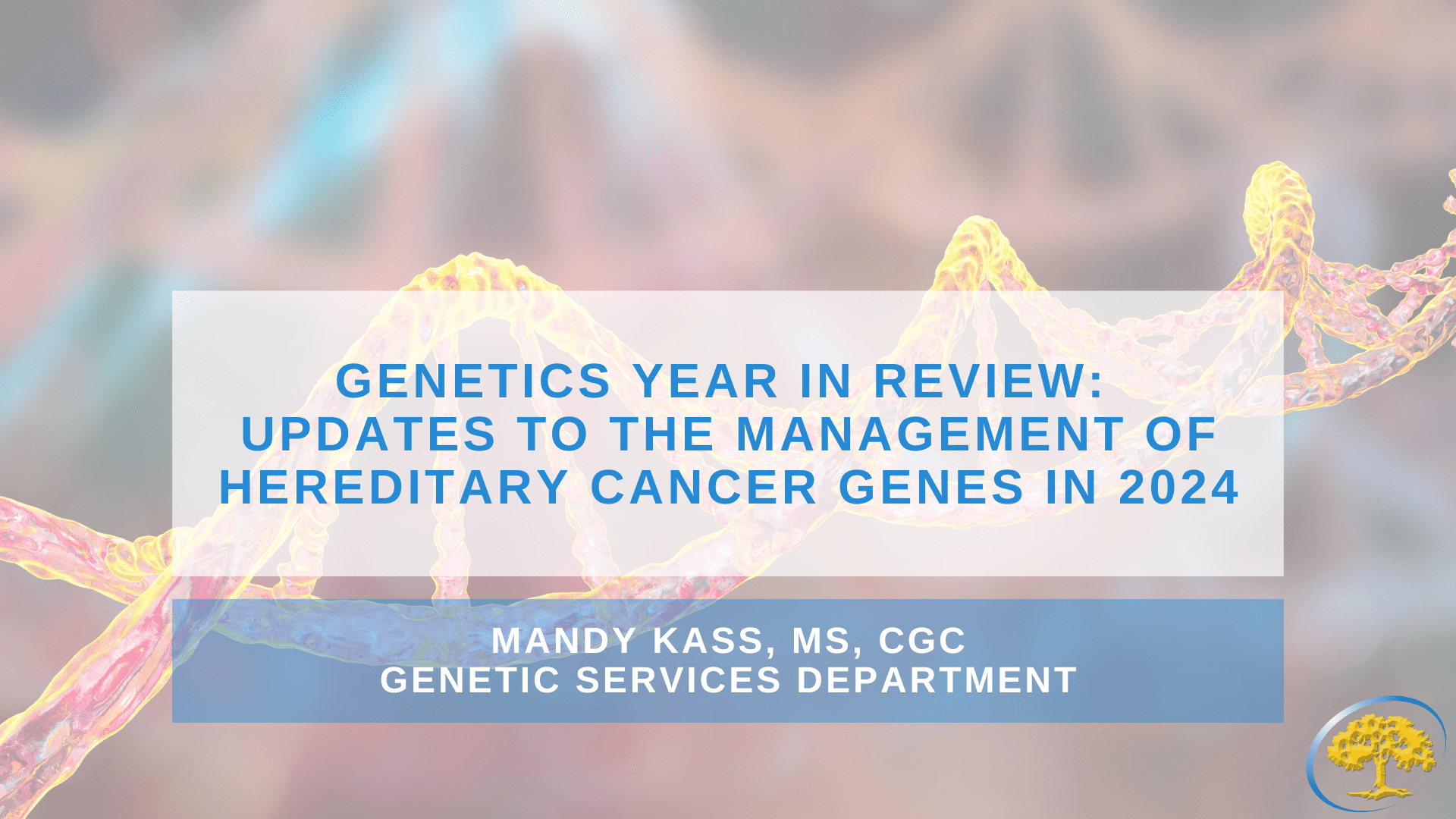
Posted 1 year ago
Genetics Year in Review: Updates to the Management of Hereditary Cancer Genes in 2024
Our understanding of hereditary cancer susceptibility genes is constantly evolving. For anyone who has tested positive for a gene mutation that increases their risk of cancer, certain screening changes have likely been recommended for them. Over time, these screening recommendations may change. This review covers the management changes that have occurred in 2024 regarding hereditary cancer susceptibility genes. Specifically, this update involves changes to management of individuals with mutations in ATM, APC (I1307K increased risk variant), BRCA2, and CHEK2. If you have a mutation within one of these genes, this update is for you!
ATM & BRCA2 Pancreatic Cancer Risks & Screening:
Per the National Comprehensive Cancer Network (NCCN), emerging data have examined the efficacy of pancreatic cancer screening in select individuals at increased risk of pancreatic cancer. To date, most such studies have restricted pancreatic cancer screening to individuals with a known mutation in a cancer susceptibility gene (ATM, BRCA1, BRCA2, PALB2, TP53, and Lynch syndrome) AND a family history of pancreatic cancer in a close relative.
Per recent updates, pancreatic cancer screening is now recommended for all ATM and BRCA2 mutation carriers regardless of family history. Specifically, guidelines now recommend individuals with a pathogenic or likely pathogenic mutation in the ATM or BRCA2 gene begin pancreatic cancer screening at age 50 or 10 years younger than the earliest pancreatic cancer diagnosis in the family (whichever is earlier). For individuals considering pancreatic cancer screening, NCCN recommends considering screening using annual contrast-enhanced MRI/magnetic resonance cholangiopancreatography (MRCP) and/or endoscopic ultrasound (EUS).
CHEK2, ATM, & APC (I1307K) Colorectal Cancer Risks & Screening:
Previously, it was thought that individuals with a mutation in the CHEK2 gene were at increased risk for colorectal cancer, and therefore were recommended to make changes to their colorectal cancer screening. Recent NCCN guideline changes now suggest that there is no increased risk of colorectal cancer in individuals with a CHEK2 mutation and therefore age-appropriate colorectal cancer screening is now recommended (colonoscopies beginning at age 45 and repeating every 10 years). However, in individuals with a personal history of or a close relative (parent, sibling, or child) with colorectal cancer, increased screening may still be recommended. This may include colonoscopies beginning at age 40 and repeating every 5 years.
The APC I1307K variant is considered an increased risk allele as it leads to an approximately 2-fold increased risk of colorectal cancer. This variant is seen in approximately 6-11% of individuals of Ashkenazi Jewish ancestry. Certain guidelines have suggested that only individuals with Ashkenazi Jewish ancestry and this specific APC I1307K variant need to consider making changes to their colon cancer screening. However, NCCN recommends that all individuals with this APC I1307K variant, regardless of ancestry, consider beginning colonoscopies at age 40 and repeating them every 5 years.
In addition, colorectal cancer risk has now been added to the ATM gene (estimated absolute lifetime risk of 5-10%). However, per NCCN, there is insufficient evidence to recommend specialized colorectal cancer screening recommendations. Screening should instead be guided by a personal and/or family history of colorectal cancer.
We anticipate that updates like these will continue to occur throughout the years. Because of this, it’s important to remain in regular contact with your local genetic counselors to stay on top of any relevant updates. We recommend reaching out to your genetics clinic annually to inquire about any changes to guidelines or changes to your family history of cancer. If you have questions or would like more information about hereditary cancer susceptibility gene updates, please contact the ICRC Genetic Services Department or request a referral from your Ironwood provider.
Mandy Kass, MS, CGC
Certified Genetic Counselor

The ultimate goal of cancer genetic counseling is to empower patients to use their personal risk information to better inform treatment and management decisions and to educate family members on their possible cancer risks.
Mandy obtained her Bachelor of Science degree in Psychology from Arizona State University in 2013. She then went on to pursue her Master’s Degree in Human Genetics from Sarah Lawrence College and graduated in 2016. Her training in genetic counseling included clinical rotations at several locations throughout New York City, including Columbia University Medical Center, Mount Sinai Beth Israel, and Bellevue Hospital.
Prior to pursuing her graduate degree, Mandy worked for the National Suicide Prevention Lifeline. She is also a member of the National Society of Genetic Counselors and of the Cancer Special Interest Group. Outside of work, Mandy enjoys exploring Arizona, traveling, and spending time with her family, friends, and two golden retrievers.
She is happy to be part of Ironwood Cancer & Research Centers and to manage a genetic counseling department based on individualized care, patient education, and supportive guidance.
